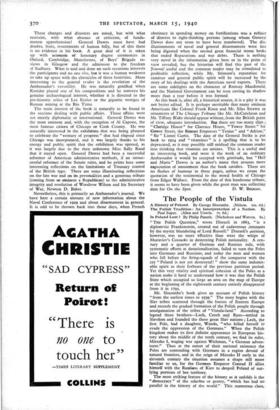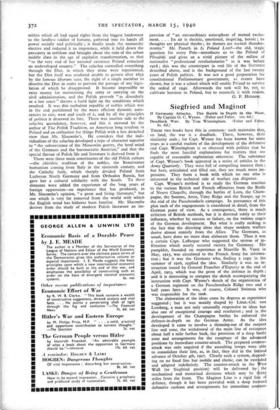The People of the Vistula
Is Poland Lost ? By Philip Paneth. (Nicholson and Watson. 6s.) " THE Polish Question," wrote Disraeli in 1863, " is a diplonntic Frankenstein, created out of cadaverous ,remnants by the mystic blundering of Lord Russell." Disraeli's eterision, however, was no more effective than were the whips of Muraviev's Cossacks in destroying Polish nationality. A cen- tury and a quarter of German and Russian rule, with systematic efforts at denationalisation, failed to turn the Poles into Germans and Russians, and today the men and women who fall before the firing-squads of the. conqueror with the cry " Poland is not yet destroyed! " show the same indomit- able spirit as their forbears of the previous partition period. Yet this very vitality and spiritual cohesion of the Poles as a nation make it hard to understand how it was that the Polish State which occupied so large an area on the map of Europe at the beginning of the eighteenth century entirely disappeared from it in 1795.
Mr. Slocombe's book gives an account of Polish history " from the earliest times to 1939." The story begins with the Slav tribes scattered through the forests of Eastern Europe and records the gradual formation of the Polish people through amalgamation of the tribes of " Vistula-land." According to legend three brothers—Lech, Czech and Russ—settled in Slavdom and founded the three great Slav nations ; Lech, the first Pole, had a daughter, Wanda, "who killed herself to evade the oppression of the Germans." When the Polish kingdom makes its first definite appearance in European his- tory about the middle of the tenth century, we find its ruler, Mieszko I, waging war against Wickman, " a German adven- turer." Thus at the outset of their national existence the Poles are contending with Germans in a region devoid of natural frontiers, and in the reign of Mieszko II early in the eleventh century the situation assumes a shape still more familiar to us, for the German Emperor Conrad II allies himself with the Russians of Kiev to despoil Poland of out- lying portions of her territory.
The most striking feature of the history as it unfolds is the " democracy " of the szlachta or gentry, "which has had no parallel in the history of the world." This numerous class,
within which all had equal rights from the biggest landowner to the landless soldier of fortune, gathered into its hands all power socially and politically ; it finally made the monarchy elective and reduced it to impotence, while it held down the peasantry in serfdom and brought about the ruin of the urban middle class in the age of capitalist transformation, so that " to the very end of her national existence Poland remained an undeveloped country." The szlachta controlled everything through the Diet, in which they alone were represented, but the Diet itself was rendered unable to govern after 1652 by the famous liberum veto, the right of a single member to dissolve the Diet in order to prevent the passage of any legis- lation of which he disapproved. It became impossible to raise money for maintaining the army or carrying on the civil administration, and the Polish proverb " as disorderly as a law court " throws a lurid light on the conditions which resulted. It was this turbulent republic of nobles which was in the end partitioned by the more efficient dynastic auto- cracies to east, west and south of it, and by all the principles of politics it deserved its fate. There was another side to the szlachta ascendancy, however, and this is stressed by the author of The Polish Tradition, an American long resident in Poland and an enthusiast for things Polish with a less detached view than Mr. Slocombe's. He considers that the indi- vidualism of the szlachta developed a type of character superior to " the subservience of the Muscovite gentry, the herd mind of the Germans and the bureaucratic Austrian," and that the special flavour of Polish life and literature is derived from it.
There were three main constituents of the old Polish culture —the chivalric tradition of the nobles, the Renaissance humanism coming from Italy in the sixteenth century, and the Catholic faith, which sharply divided Poland from Lutheran North Germany and from Orthodox Russia, but gave her a cultural solidarity with the South. To these elements were added the experience of the long years of foreign oppression—an experience that has produced, in Mr. Slocombe's opinion, " a great and living literature," but one which is very far removed from the world with which the English mind has hitherto been familiar. Mr. Slocombe derives from the study of modern Polish literature an im-
pression of " an extraordinary atmosphere of mental excite- ment. . . . Its air is electric, emotional, inspiring, heroic ; its thoughts are physical throbs ; its themes are mental thunder- storms." Mr. Paneth in Is Poland Lost?—the old, tragic question for every Pole—introduces us to the Poland of Pilsuilski and gives us a vivid picture of the milieu of nationalist " professional revolutionaries " as it was before 1918 ; this was the counterpart in real life of the literature described above, and is the background of the last twenty years of Polish politics. It was not a good preparation for constitutional Parliamentary government, as events have shown, but it was a school which will enable Poland to survive the ordeal of 1940. Afterwards the task will be, no to cultivate heroism in Poland, but to reconcile it with reaon.
G. F. HUDS0t.























































 Previous page
Previous page